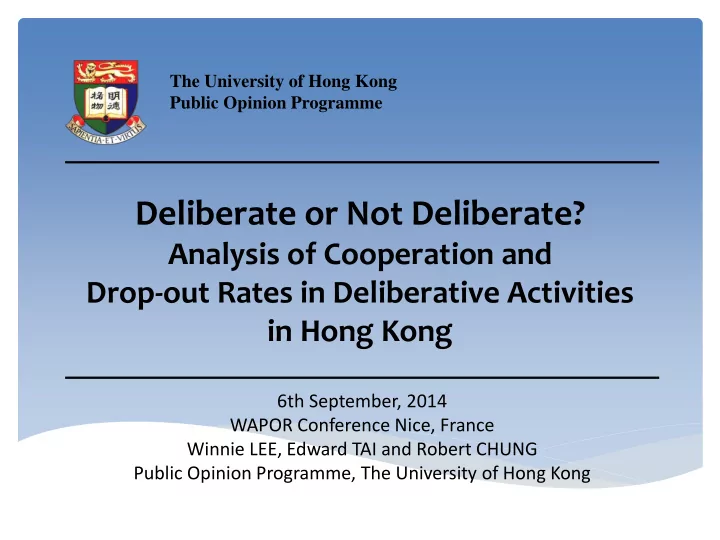

The University of Hong Kong Public Opinion Programme Deliberate or Not Deliberate? Analysis of Cooperation and Drop-out Rates in Deliberative Activities in Hong Kong 6th September, 2014 WAPOR Conference Nice, France Winnie LEE, Edward TAI and Robert CHUNG Public Opinion Programme, The University of Hong Kong
Deliberation Deliberative Polling designed to overcome the defects of conventional opinion surveys resorting to educated and rational deliberations among group of people drawn randomly from public In Hong Kong DP has found its way into various forms like Deliberative Forums (DFs), Deliberative Meetings (DMs), and miniature experimental DPs since 2009 Recent civil disobedient movement (OCLP) - expands the concept of deliberation to proactive opinion expression and civil engagement 2
Deliberate or Not Deliberate? Challenge: get the representative sample to show up! Research Question: What affects people’s interests and cooperation behaviors? Approach: Logistic regression Independent variables = predicting factors Dependent variables = interests, confirmation, show up 3
10 Deliberative Events in HK since 2010 Date Topic Type Political Reform Feb 6, 2010 DF 2023 Asian Games Bid Jan 9, 2011 DF Mechanism for Filling Vacancies Sep 11, 2011 DF in the Legislative Council Expectation of Policy Address Dec 16, 2012 DM Method of Chief Executive Election 2017 May 5, 2013* DF Possible Challenges of “Occupy Central Jun 9, 2013* Experimental DP & DM with Love and Peace” Movement Landfill Expansion Aug 24, 2013* DF Design of Chief Executive Election Sep 29, 2013* Experimental DP Policy Address 2014 Nov 16, 2013* DM Civil Nomination Mar 16, 2014* DF 4 * Event analyzed
Models 5
123 12 Model 3 2 1 P P P P P P P P P P P P P P P P P P 1. Deliberation topic 2. Venue location 3. Event day 4. Monetary incentive 5. Compensation rate P P P P P P P P P P P P P P P P P P P P P P P 6. Attractiveness of speakers 7. Travel mode 8. Weather-temperature 9. Weather-rain Variables 10. No. of days approached before event P P P P P P P P P P P P P P P P P P P P P P P P P P P P P P P P P P P P P P P P P P P P P P P P P P P P P P P P P P P P 11. Demo-gender 6 12. Demo-age 13. Demo-social class 14. Demo – residential district 15. Demo-household size 16. Demo-voter registration status 17. Demo-political affiliation 18. Demo-education level 19. Demo-house ownership 20. Demo-type of housing 21. Demo-marital status 22. Demo-occupation 23. Demo-personal income 24. Demo-place of birth
Analytical framework 5 models in total Model 1: among all respondents, are they interested? Model 2: among those interested, will they confirm? Model 3: among those confirmed, will they show up at the end? Model 12: among all respondents, will they confirm? Model 123: among all respondents, will they show up at the end? 24 independent variables used Model 1, 12, 123: 19 standard variables Model 2: Monetary incentive Compensation rate Attractive of speakers Travel mode Model 3: Temperature & rainfall 7
Results – Model 1: Base: 34,352; interest: 2,657 (8%) 8
Results – Model 2: Base: 2,657; confirm: 1,027 (39%) 9
Results – Model 3: Base: 1,027; showup: 620 (60%) 10
Results – Model 12: Base: 34,352; confirm: 1,027 (3%) 11
Results – Model 123: Base: 34,352; showup: 620 (2%) 12
Conclusion Strong predictors : males, registered voters, and democracy supporters Surprising finding: higher monetary compensations may not necessarily attract more participation individuals who opted for shuttle bus appeared to be much more likely to show up than those who don’t Yet the small R 2 values of the models may hint at some predicting variables other than event-specific and demographics variables, such as the participants’ knowledge of the deliberation topic, their willingness to have their voices be heard etc. etc. 13
Further studies Go deeper : to understand the reason for the predicting factors why women are less likely to participate in these events? why is voter registration a significant predictor of participation? Go wider : to locate other possible predicting variables Go further : to explore the possible explanations of these findings may be a follow-up questionnaire or in-depth interviews with both the participated and non-participated individuals 14
Thank you! For more information, please email us as: winnie.lee@hkupop.hku.hk or edward.tai@hkupop.hku.hk
Recommend
More recommend